#something something poetry something
Photo
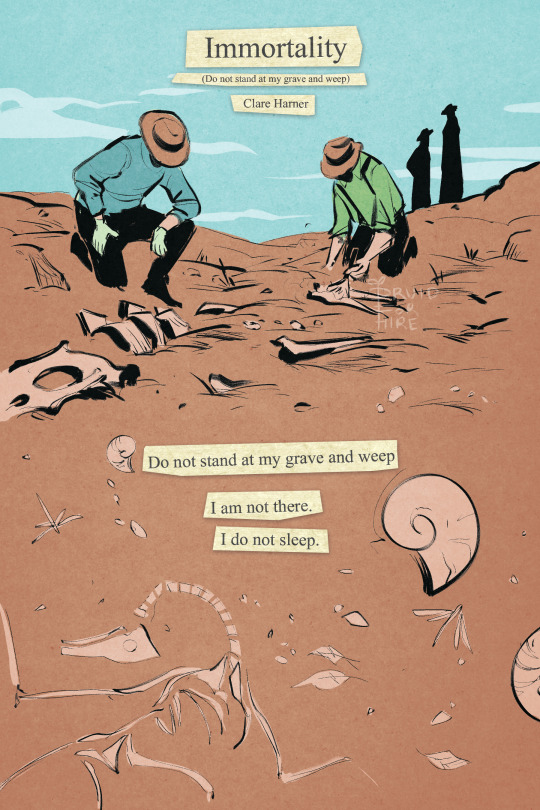
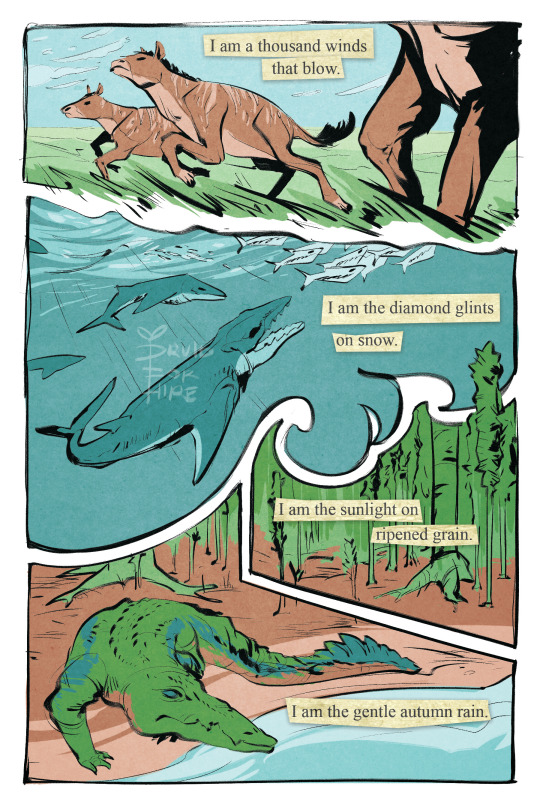
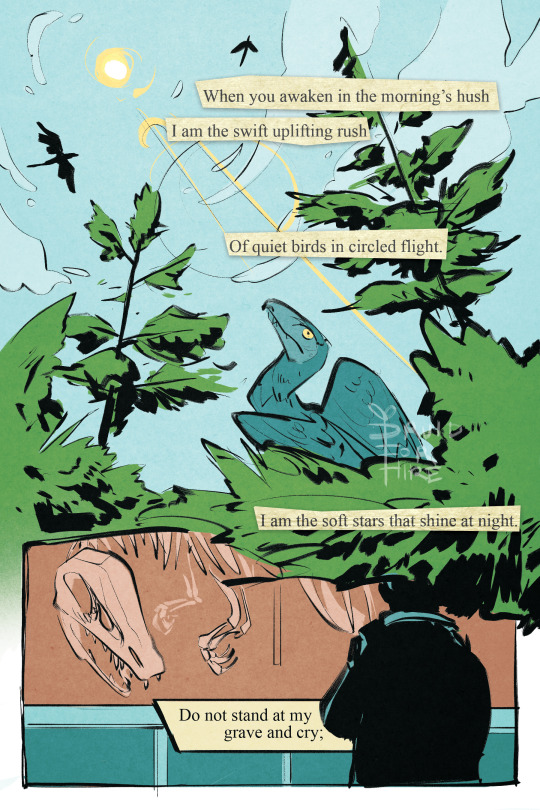
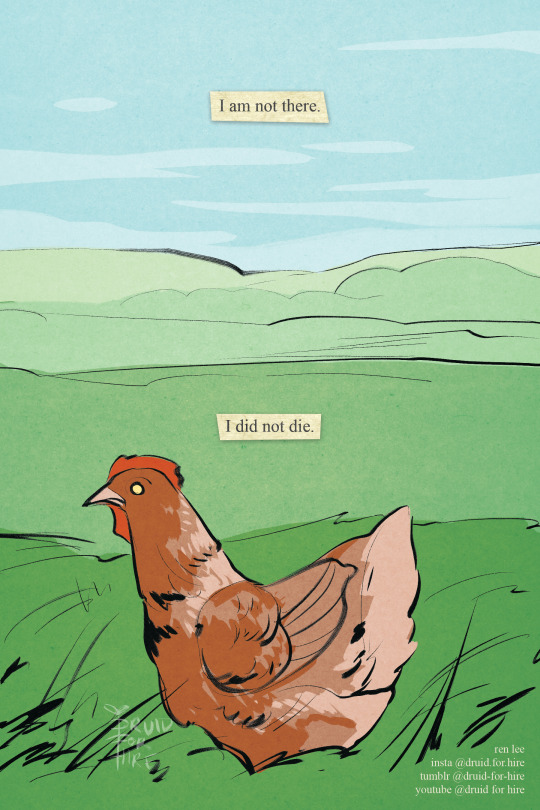
[image id: a four-page comic. it is titled "immortality” after the poem by clare harner (more popularly known as “do not stand at my grave and weep”). the first page shows paleontologists digging up fossils at a dig. it reads, “do not stand at my grave and weep. i am not there. i do not sleep.” page two features several prehistoric creatures living in the wild. not featured but notable, each have modern descendants: horses, cetaceans, horsetail plants, and crocodilians. it reads, “i am a thousand winds that blow. i am the diamond glints on snow. i am the sunlight on ripened grain. i am the gentle autumn rain.” the third page shows archaeopteryx in the treetops and the skies, then a modern museum-goer reading the placard on a fossil display. it reads, “when you awaken in the morning’s hush, i am the swift uplifting rush, of quiet birds in circled flight. i am the soft stars that shine at night. do not stand at my grave and cry.” the fourth page shows a chicken in a field. it reads, “i am not there. i did not die” / end id]
a comic i made in about 15 hours for my school’s comic anthology. the theme was “evolution”
#dinosaur#evolution#comic#prehistoric#animal#wildlife#paleontology#biology#poetry#comics#original#my art#archaeopteryx has no direct living descendants i know#but i wanted something aerial and the dinosaur to bird connection is classic and well known anyway#also the chicken over any other bird is very on purpose#its the mix of truth and comedy and genuineness and the fantastic in the mundane#its me asking you to see something so wonderful in something taken so un-seriously#and to love it both ways#also the jurassic park thing#where someone saw the reconstructed gait of a dino#and said. hey hang on. i know that walk.#and pulled up footage of a chicken walking#which jumpstarted the entire study into the link between dinosaurs and birds#in the end take whatever you want from it i just thought id provide some insight#i always like it when other artists do#the point is that i enjoy when people laugh at the end and when they dont#and i like it when they cry. i like it best when they both laugh and cry. eeaao intent#anyway mourn your losses but to live is to change#also hi guys i finally figured out tipping after 5 months so no more annoying ko-fi link
145K notes
·
View notes
Text
don’t you love when you’re casually reading a random poem and suddenly come across a line that burrows into your bones and becomes the definition of your heart for the next 17 years
#poetry posting#Me with ‘lord we owe the world such tenderness’#And ‘In the next life I’ll become something useful. like a staple gun. or in love.’#Or ‘our great betrayal is our infinite gentleness’#Like WHAT THE HELL#poetry#reading poetry
14K notes
·
View notes
Text
i sit in the sun. i drink tea. i recieve a message from my friend. i read a book. i take a walk. i fall in love with life a little bit.
#today was a good day#on how to enjoy life through something small#positivity#life#light academia aesthetic#green academia#poetry#chaotic academia#diary entry#romanticize#romantic core#poetic#spilled thoughts#spilled words#hopepunk
25K notes
·
View notes
Text









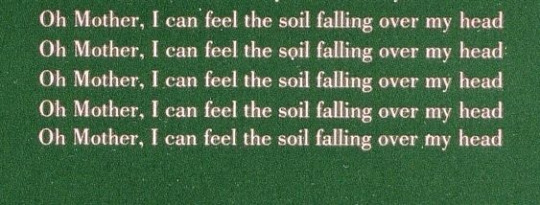



myths & martyrs, and what they leave behind.
transformers comic (source by @mythgradeconstellation, fellow ORV lover??) // André Malraux quoted by Mary Gordon in Joan of Arc: A Life // Gregory Orr // the tragic hero; michael kinnucan, the gods show up // Loss, H.D. // Margarita Karapanou // Hélène Cixous, The Selected Plays of Hélène Cixous // this post // it's hard to be a saint in the city, Bruce Springsteen // i know it’s over, the smiths // unknown // on earth we're briefly gorgeous, ocean vuong // unknown
#the last one is icarus lucifer something something. please let me know if you find it.#poetry#quotes#spilled ink#poems and quotes#spilled poetry#words#webweaving#webweave#aesthetic#poems and poetry#writing#poem#spilled thoughts#web weaving#*mine: graphics#sort of alternating pov between martyr // people they leave behind
2K notes
·
View notes
Text
mike flannagan essentially saying that greed and capitalism and the hunger for money (not borne out of a need for safety and contentment, but for power and the urge for more) is death to an artist. that poetry and truth and art cannot live in tandem with greed. that they are anathema to the duplicitous, treasonous and covetous nature of the wealthy and gluttonous.
#how verna said something about poetry being the vessel for hard truths#and roderick spent his entire life lying and lying and killing the poet inside of him#woof#mike flannagan#the fall of the house of usher#usher spoilers#house of usher
4K notes
·
View notes
Text

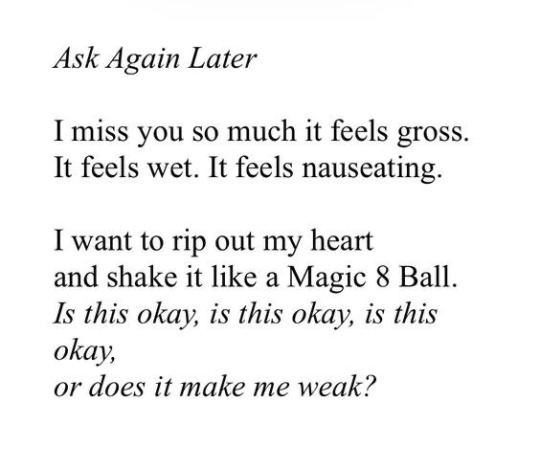

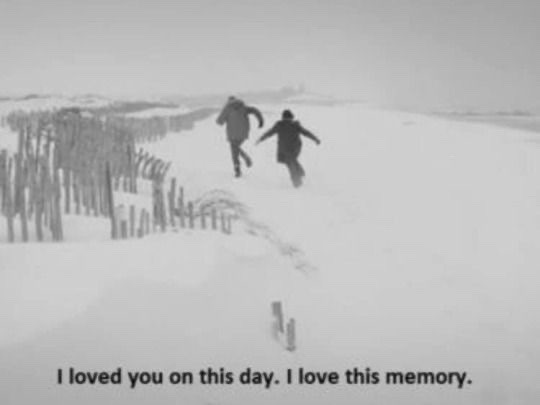
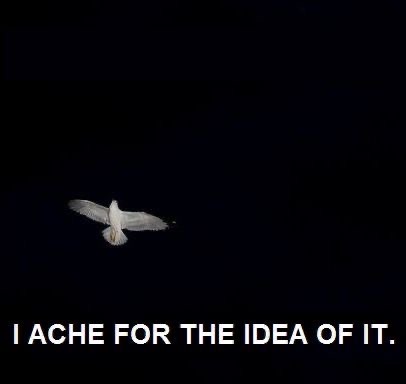
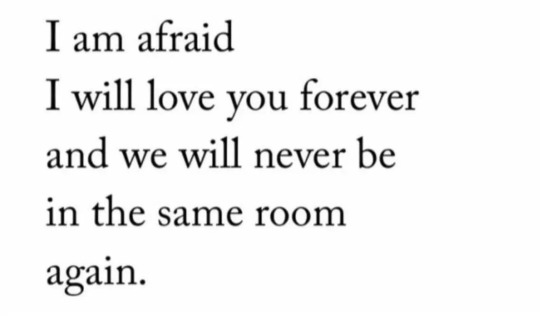
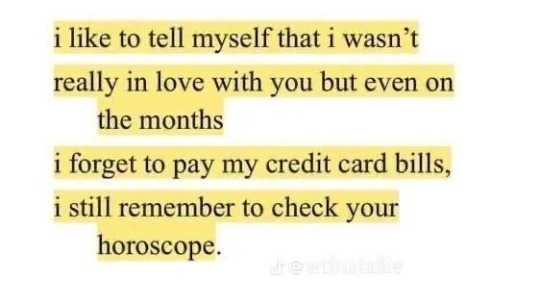
missing someone bad for you
trista mateer / trista mateer / sue zhao / u.k / u.k / clementine von radics / trista mateer
#web weaving#webweaving#on loneliness#on grief#on missing someone#on love#quotes#poetry#text#i miss them so bad it aches! i want to cry in their lap again! i want to tell them about everything! i want the world to stop ending!#i was treated like a dog. i left on my own but i still miss the doghouse in the backyard#it wasn’t much but it was something. i should’ve taken what little i could get. i didn’t know that i would leave and get nothing instead#the decision to eat nothing instead of the scraps on the floor is insane. and now i’ve got nobody and we’ll never talk again#there’s a person with half of my soul walking around and i can’t do shit about it#i forget them for a moment but then i see them in my instagram notifs and i blow up the world
2K notes
·
View notes
Text
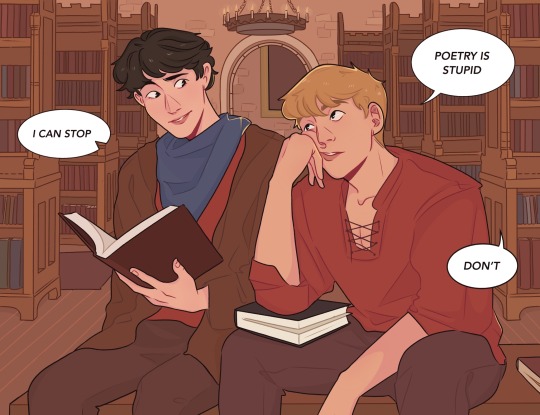
imagining arthur following merlin to the library to annoy him into reading out loud
#bbc merlin#merthur#arthur pendragon#merlin#they were reading poetry for real he didn’t lie!!#wanted to draw something heart wrenching again but thought you can have this as a treat
10K notes
·
View notes
Text
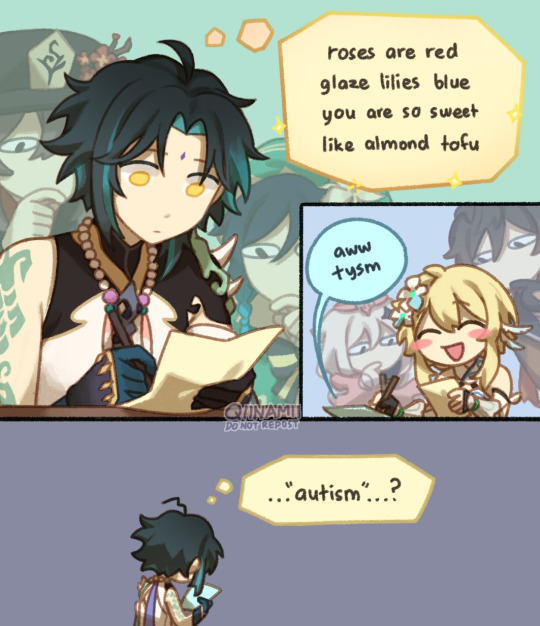
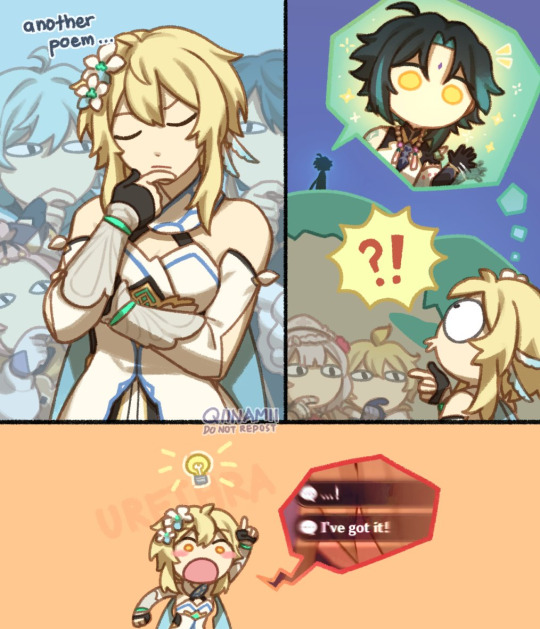
quite the poet, quite the inspo
#its a two parter but i'm not sure if i want to upload both bc the first one goes miles better and it was initially a standalone#bc twt format that builds the humor up lol but its still cute anyway so i'm putting both up#it's really sweet and sad Xiao hasn't much of an outlet to let things go and expressing thoughts than his coping mechanisms#the self destruction he's not aware about as it's veiled by reason of duty#so it's good that he's encouraged to use poetry as one of it#expression portrayed through words tailored in vagueness but also direct symbolism of something... just to encapsulate that meaning idk idk#qiiarts#xiao#lumine#traveler#paimon#zhongli#venti#hu tao#chongyun#xingqiu#diona#mika#noelle#genshin impact
2K notes
·
View notes
Text
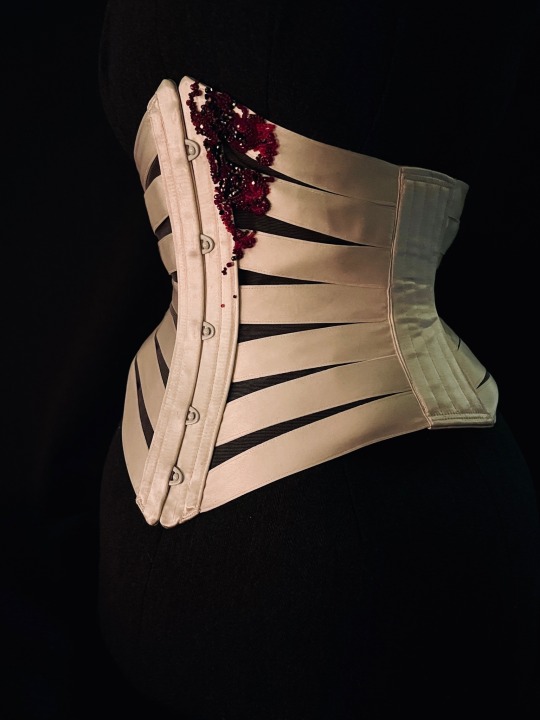
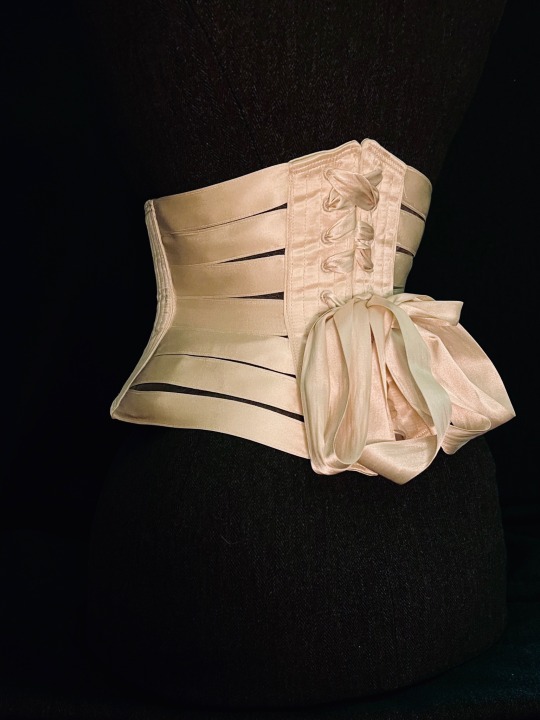
The Saddest Girl In The World
Edwardian-ish ribbon corset with beading, 2023
Silk ribbon, cotton taffeta ribbon, Czech glass beads
#project: crown prince kiriona#project: ribbon corset#project: historical sewing#cosplay#media: the locked tomb#tlt#the locked tomb#historical costume#Edwardian#Nona the ninth#historical sewing#costume#poetry in costume#beading#excuse the iffy lacing I used what I had on hand which is too wide and I didn’t want to unlace Helga#EDIT: upsetti#I captioned it something sensible rather than WHITHER THE HAMBURGER???#there’s time#not sure why this has broken 1000 notes but it is releasing all the brain chemicals
3K notes
·
View notes
Text
Oh to have the poetic symbiosis of a rogue who bites people when he’s stressed and a barbarian who becomes resistant to physical damage when he’s protecting his friends
#we learned something VERY IMPORTANT today and it is that riz is a BITER and gorgug LETS HIMSELF BE BITTEN#your honor I love their friendship#something something the poetry of being lashing out when ypur overwhelmed finding a friend in someone whos interest are taking hits#and fixing things#fantasy high#fantasy high junior year#dimension 20#d20#fhjy#fhjy spoilers#d20 fhjy#dimension 20 fhjy#dimension 20 fantasy high#riz gukgak#gorgug thistlespring
2K notes
·
View notes
Text
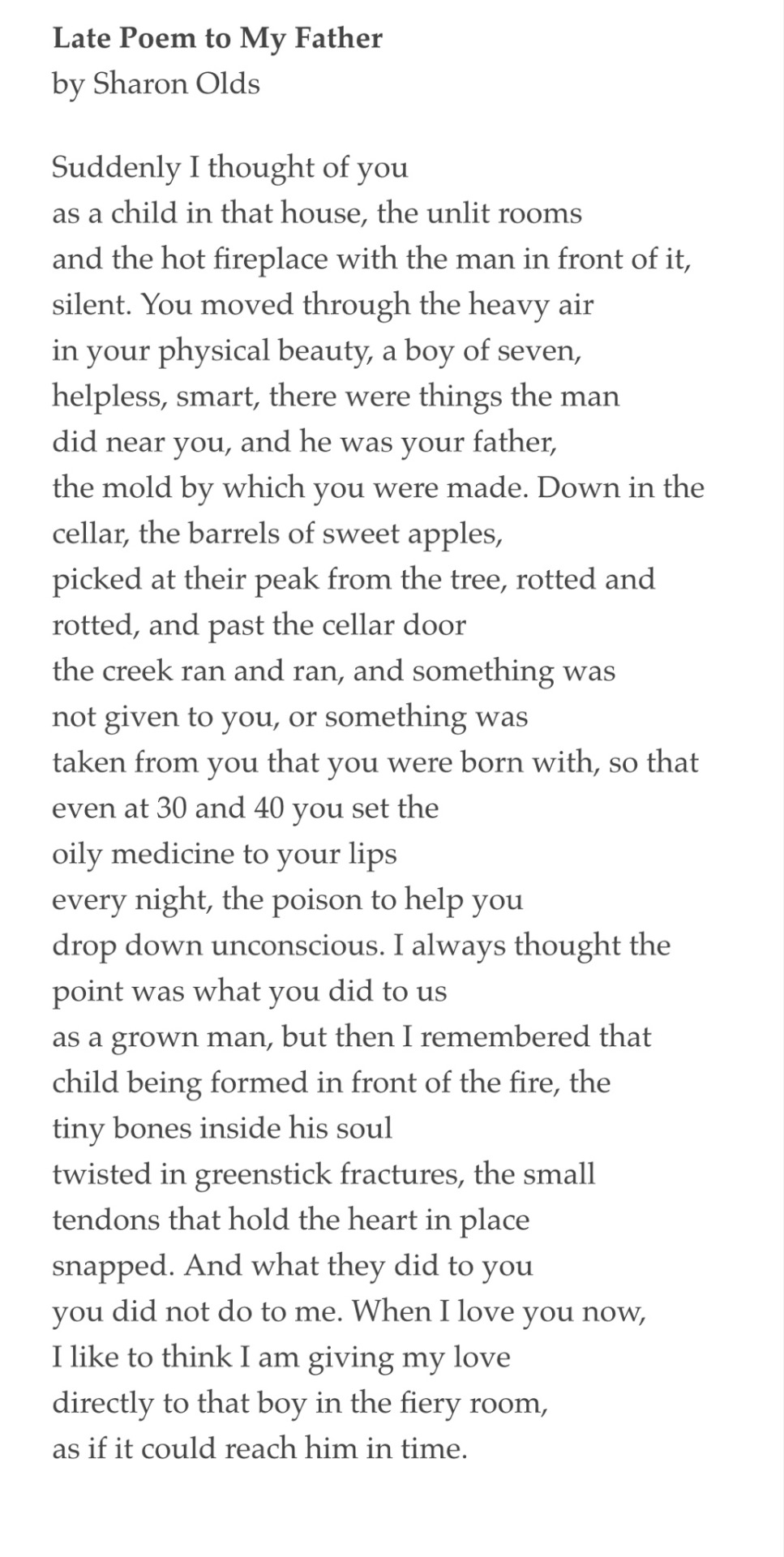
Sharon Olds, “Late Poem to My Father”
#and something was not given to you or something was taken from you that you were born with#I always thought the point was what you did to us as a grown man but then I remembered that child........#w#poetry#sharon olds
2K notes
·
View notes
Text
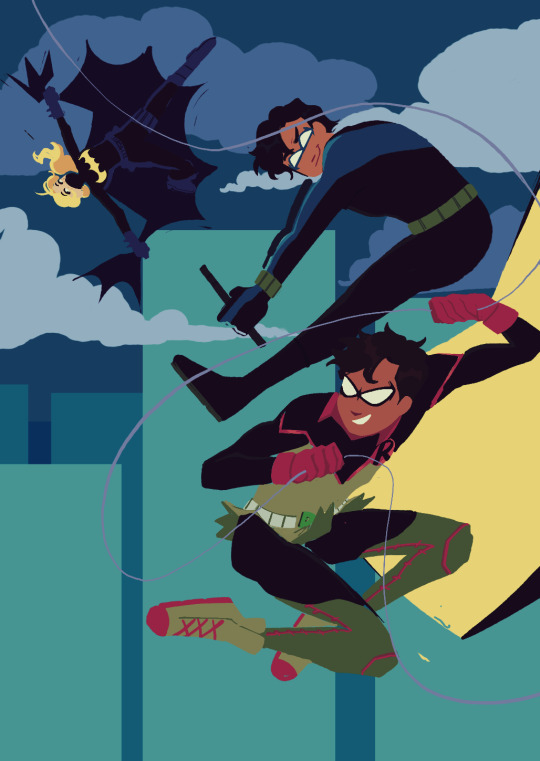
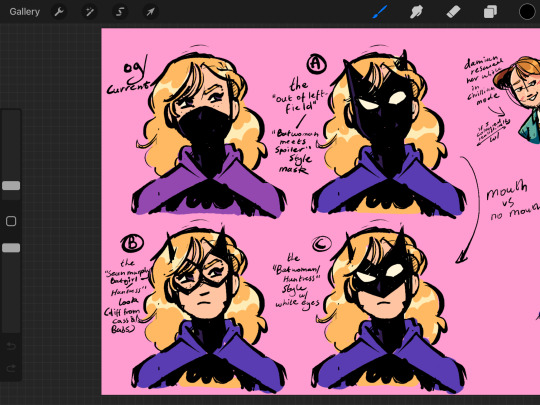

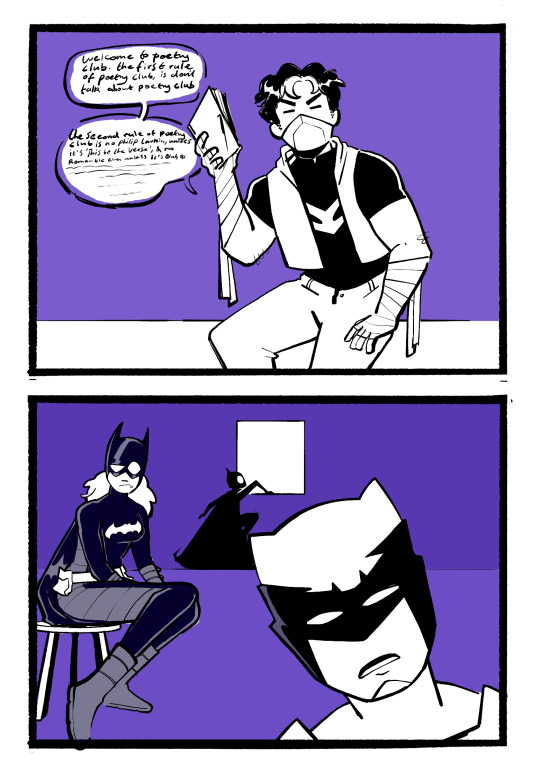
ANOTHER SKETCH DUMP! Featuring more of me playing with lineless art. Batman reborn era trio (dick, damian and steph) I miss you...when will you return from war. Also featuring Steph designs bc I've seen ppl dissatisfied w/ her current look, some good mom Talia, and Jason Todd poetry club. Duke is confused not that Jason would start a poetry club but that he'd have such mid poetry opinions. (ID in Alt)
#dc comics#batfamily#damian wayne#stephanie brown#dick grayson#talia al ghul#duke thomas#cassandra cain#mine#woo new art tag. please god let me keep this up all year#uhh anyway yeah! still a big backlog of sketches but i got burnt out which means i had time to collect some#i feel like my art looks. extremely different w/o lines compared to with? idk i worry that's it weird/off-putting#but hey at the end of the day I'm hardly worrying about my brand integrity on tumblr dot com#duke and cass being at poetry club is based on them canonically being into poetry and for a good while duke and jason got along well#Steph is there for both jason and cass' emotional support (unfortunately there's a design flaw. she can't do both simultaneously)#(which is fine bc cass is fleeing the scene at the idea of having to casually hang out with jason)#(they're the exact amount of similar and more importantly different that it's like putting two firecrackers together. bad)#i really like the steph mask designs... it'd be fun to do something with them but idk what y'know?#I'm just like. if we're assuming that her mask has to be different from both babs and cass then this is what I've got as alternatives#i mostly wanted to practice character interaction with the talia and damian one... and also i love them#looking at james gunns batman movie proposal. you keep your hands OFF HER MR GUNN#please if shes evil in a movie they're never gonna let her be good in the comics again 😭#dc when you inevitably cave and do your next big reboot let the ppl finally have the son of the demon origin (w/ tweaks of course)#idk it's canon in my heart. heartcanon if you will <3#anyway yeah uhhhhhh enjoy?
1K notes
·
View notes
Text
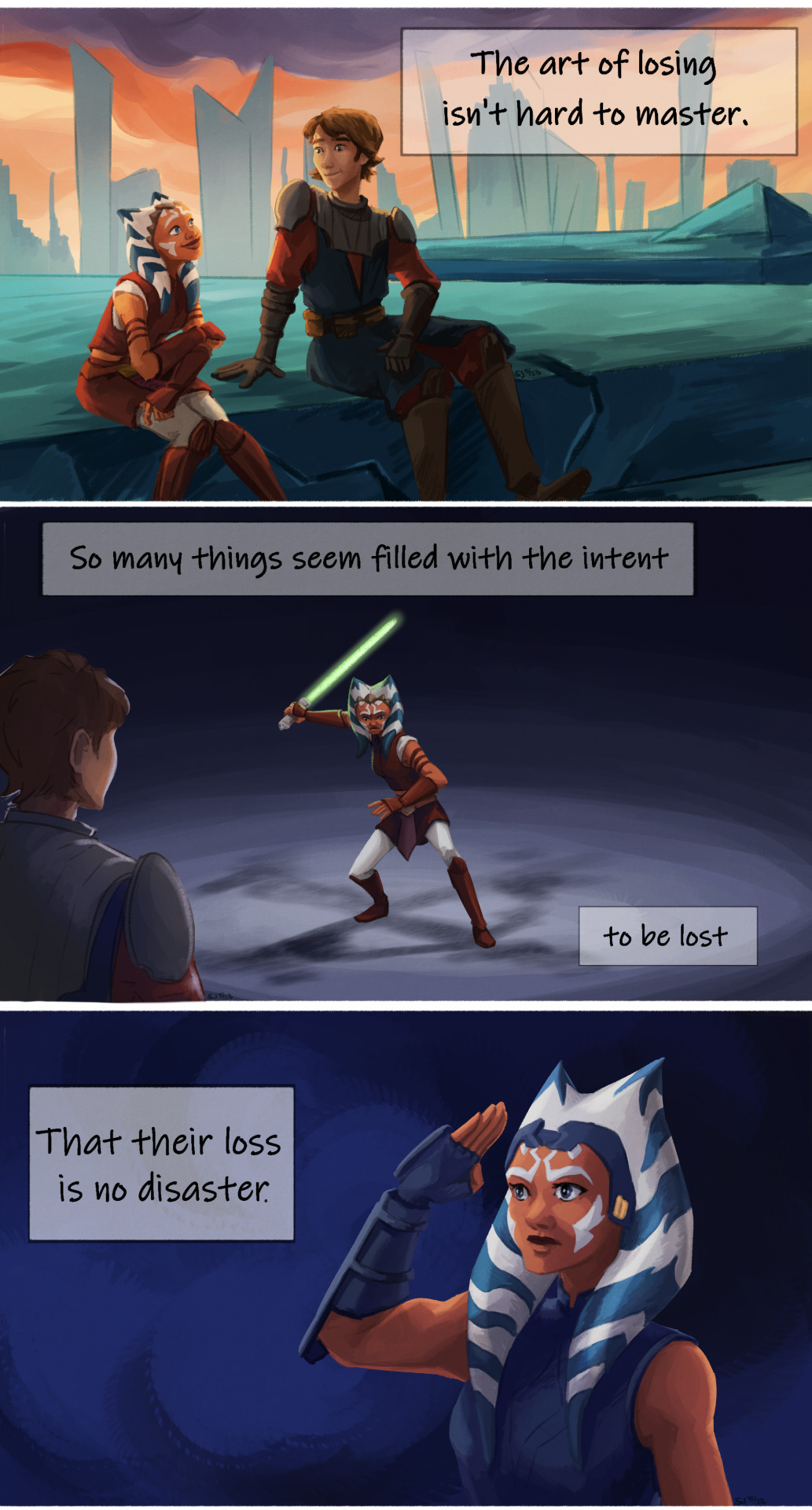

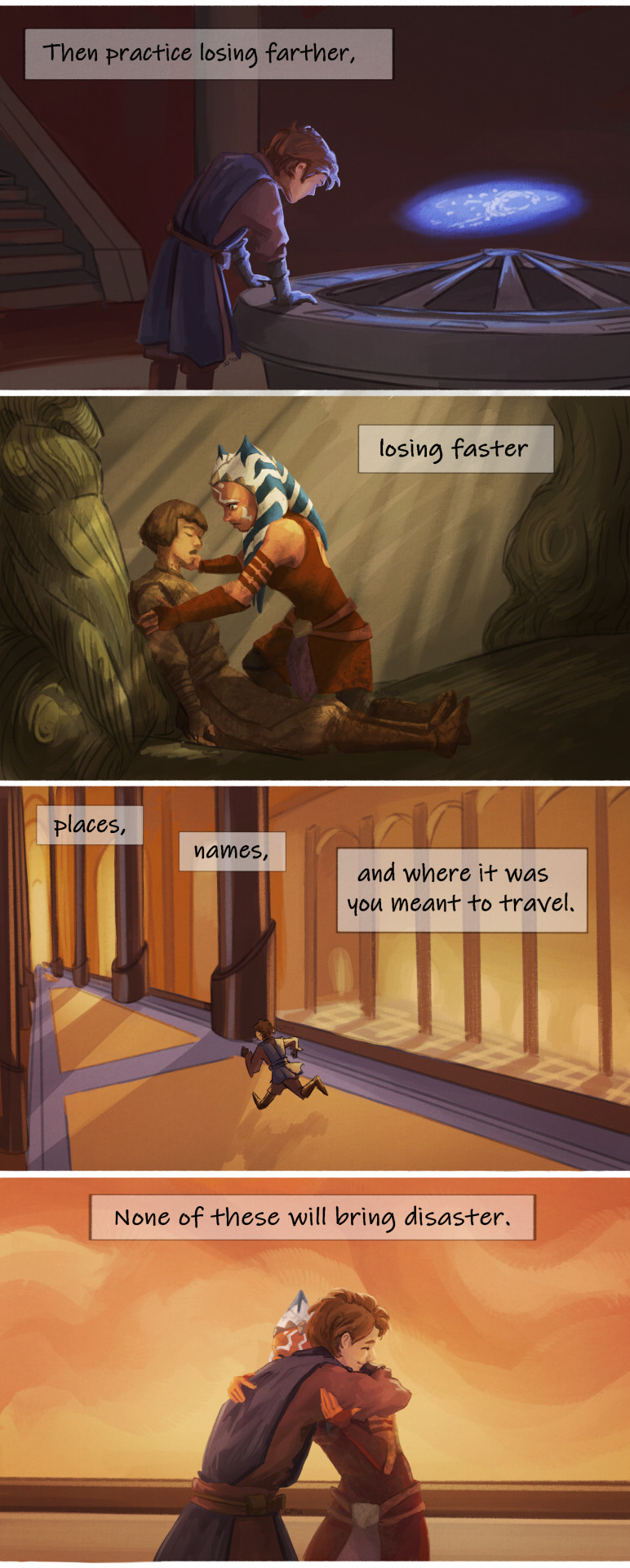

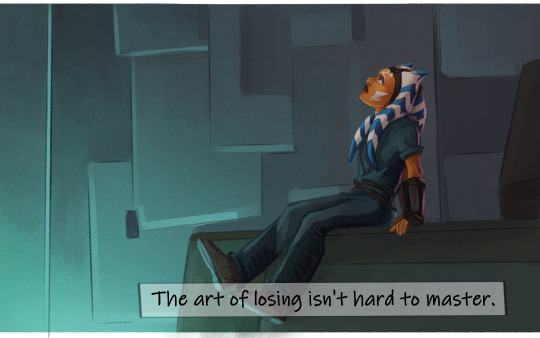

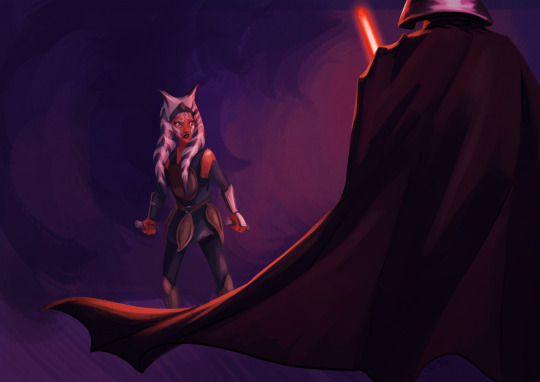
—Even losing you (the joking voice, a gesture
I love) I shan't have lied. It's evident
the art of losing's not too hard to master
though it may look like (Write it!) like disaster.
-- 'One Art' by Elizabeth Bishop
you ever think about how after everything Ahsoka told Vader "I'm not leaving you" and it wasn't enough
#ahsoka#star wars#anakin skywalker#darth vader#swr#tcw#xuserann#my art#going FERAL about these two again actually#and about poetry.#something something about losing. and leaving. and being left. and coming back too late.#imagine ahsoka hearing how vader died.#padme and luke both said 'there's still good in him' and ahsoka KNEW that and yet he would not show it to her.#i'm chewing drywall
4K notes
·
View notes
Text
None Of You Know What Haiku Are
I'm going to preface this by saying that i am not an expert in ANY form of poetry, just an enthusiast. Also, this post is... really long. Too long? Definitely too long. Whoops! I love poetry.
If you ask most English-speaking people (or haiku-bot) what a haiku is, they would probably say that it's a form of poetry that has 3 lines, with 5, and then 7, and then 5 syllables in them. That's certainly what I was taught in school when we did our scant poetry unit, but since... idk elementary school when I learned that, I've learned that that's actually a pretty inaccurate definition of haiku. And I think that inaccurate definition is a big part of why most people (myself included until relatively recently!) think that haiku are kind of... dumb? unimpressive? simple and boring? I mean, if you can just put any words with the right number of syllables into 3 lines, what makes it special?
Well, let me get into why the 5-7-5 understanding of haiku is wrong, and also what makes haiku so special (with examples)!
First of all, Japanese doesn't have syllables! There's a few different names for what phonetic units actually make up the language- In Japanese, they're called "On" (音), which translates to "sound", although English-language linguists often call it a "mora" (μ), which (quoting from Wikipedia here) "is a basic timing unit in the phonology of some spoken languages, equal to or shorter than a syllable." (x) "Oh" is one syllable, and also one mora, whereas "Oi" has one syllable, but two moras. "Ba" has one mora, "Baa" has two moras, etc. In English, we would say that a haiku is made up of three lines, with 5-7-5 syllables in them, 17 syllables total. In Japanese, that would be 17 sounds.
For an example of the difference, the word "haiku", in English, has 2 syllables (hai-ku), but in Japanese, はいく has 3 sounds (ha-i-ku). "Christmas" has 2 syllables, but in Japanese, "クリスマス" (ku-ri-su-ma-su) is 5 sounds! that's a while line on its own! Sometimes the syllables are the same as the sounds ("sushi" is two syllables, and すし is two sounds), but sometimes they're very different.
In addition, words in Japanese are frequently longer than their English equivalents. For example, the word "cuckoo" in Japanese is "ほととぎす" (hototogisu).
Now, I'm sure you're all very impressed at how I can use an English to Japanese dictionary (thank you, my mother is proud), but what does any of this matter? So two languages are different. How does that impact our understanding of haiku?
Well, if you think about the fact that Japanese words are frequently longer than English words, AND that Japanese counts sounds and not syllables, you can see how, "based purely on a 17-syllable counting method, a poet writing in English could easily slip in enough words for two haiku in Japanese” (quote from Grit, Grace, and Gold: Haiku Celebrating the Sports of Summer by Kit Pancoast Nagamura). If you're writing a poem using 17 English syllables, you are writing significantly more content than is in an authentic Japanese haiku.
(Also not all Japanese haiku are 17 sounds at all. It's really more of a guideline.)
Focusing on the 5-7-5 form leads to ignoring other strategies/common conventions of haiku, which personally, I think are more interesting! Two of the big ones are kigo, a season word, and kireji, a cutting word.
Kigo are words/phrases/images associated with a particular season, like snow for winter, or cherry blossoms for spring. In Japan, they actually publish reference books of kigo called saijiki, which is basically like a dictionary or almanac of kigo, describing the meaning, providing a list of related words, and some haiku that use that kigo. Using a a particular kigo both grounds the haiku in a particular time, but also alludes to other haiku that have used the same one.
Kireji is a thing that doesn't easily translate to English, but it's almost like a spoken piece of punctuation, separating the haiku into two parts/images that resonate with and add depth to each other. Some examples of kireji would be "ya", "keri", and "kana." Here's kireji in action in one of the most famous haiku:
古池や 蛙飛び込む 水の音
(Furu ike ya kawazu tobikomu mizu no oto)
(The old pond —
A frog jumps in
The sound of the water.)
You can see the kireji at the end of the first line- 古池や literally translates to "old pond ya". The "ya" doesn't have linguistic meaning, but it denotes the separation between the two focuses of the haiku. First, we are picturing a pond. It's old, mature. The water is still. And then there's a frog! It's spring and he's fresh and new to the world! He jumps into the pond and goes "splash"! Wowie! When I say "cutting word", instead of say, a knife cutting, I like to imagine a film cut. The camera shows the pond, and then it cuts to the frog who jumps in.
English doesn't really have a version of this, at least not one that's spoken, but in English language haiku, people will frequently use a dash or an ellipses to fill the same role.
Format aside, there are also some conventions of the actual content, too. They frequently focus on nature, and are generally use direct language without metaphor. They use concrete images without judgement or analysis, inviting the reader to step into their shoes and imagine how they'd feel in the situation. It's not about describing how you feel, so much as it's about describing what made you feel.
Now, let's put it all together, looking at a haiku written Yosa Buson around 1760 (translated by Harold G. Henderson)
The piercing chill I feel:
my dead wife's comb, in our bedroom,
under my heel
We've got our kigo with "the piercing chill." We read that, and we imagine it's probably winter. It's cold, and the kind of cold wind that cuts through you. There's our kireji- this translation uses a colon to differentiate our two images: the piercing chill, and the poet stepping on his dead wife's comb. There's no descriptions of what the poet is feeling, but you can imagine stepping into his shoes. You can imagine the pain he's experiencing in that moment on your own.
"But tumblr user corvidcall!" I hear you say, "All the examples you've used so far are Japanese haiku that have been translated! Are you implying that it's impossible for a good haiku to be written in English?" NO!!!!! I love English haiku! Here's a good example, which won first place in the 2000 Henderson haiku contest, sponsored by the Haiku Society of America:
meteor shower . . .
a gentle wave
wets our sandals
When you read this one, can you imagine being in the poet's place? Do you feel the surprise as the tide comes in? Do you feel the summer-ness of the moment? Haiku are about describing things with the senses, and how you take in the world around you. In a way, it's like the poet is only setting a scene, which you inhabit and fill with meaning based on your own experiences. You and I are imagining different beaches, different waves, different people that make up the "our" it mentioned.
"Do I HAVE to include all these things when I write haiku? If I include all these things, does that mean my haiku will be good?" I mean, I don't know. What colors make up a good painting? What scenes make up a good play? It's a creative medium, and nobody can really tell you you can't experiment with form. Certainly not me! But I think it's important to know what the conventions of the form are, so you can appreciate good examples of it, and so you can know what you're actually experimenting with. And I mean... I'm not the poetry cops. But if you're not interested in engaging with the actual conventions and limitations of the form, then why are you even using that form?
I'll leave you with one more English language haiku, which is probably my favorite haiku ever. It was written by Tom Bierovic, and won first place at the 2021 Haiku Society of America Haiku Awards
a year at most . . .
we pretend to watch
the hummingbirds
Sources: (x) (x) (x) (x) (x) (x)
Further reading:
Forms in English Haiku by Keiko Imaoka
Haiku: A Whole Lot More Than 5-7-5 by Jack
How to Write a Bad Haiku by KrisL
Haiku Are Not a Joke: A Plea from a Poet Who Has Had It Up to Here by Sandra Simpson
Haiku Checklist by Katherine Raine
#poetry#haiku#writing#literature#anime life#long post#i want to apologize but i had to get something off my chest#and the thing was. i love haiku#and when i see posts on here about haiku. i get so angy.#well ok i really get more disappointed bc nobody is really engaging with the form on its own terms#anyway i hope you enjoy some of my favorite haiku because theyre in there!!!!!#i didnt really get into the history of haiku. and i also did not get into why i got really into it#but i will say that i was really inspired by Jacob Geller's video A Thousand Ways of Seeing a Forest#which is a lot about translation#(which i mean. as an interpreter AND a poetry-enjoyer. really appealed to me lol)
10K notes
·
View notes
Text
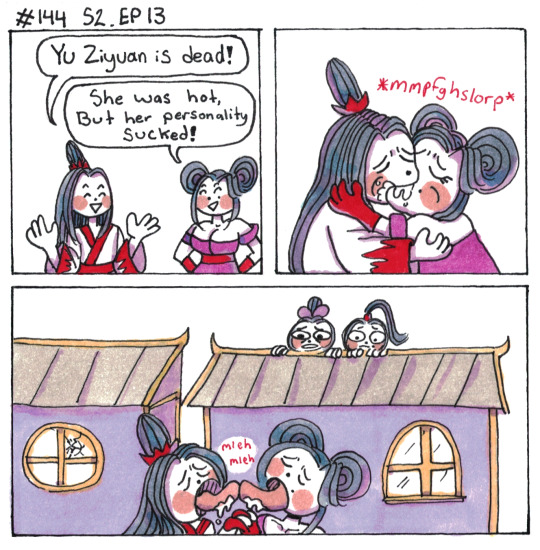
The most evil celebratory kiss
[First] Prev <–-> Next
#poorly drawn mdzs#mdzs#wei wuxian#jiang cheng#wen chao#wang lingjiao#I wrote a haiku that I almost used as the caption. Here it is:#“Up on the house top-Heterosexual kiss-Your mother is dead”#...I am not very good at poetry.#There was something so funny to me about the evil couple heterosexual sloppy kiss sandwiched between all this angst.#I get it - this is to make us really loathe these two and make the later revenge much sweeter but...honestly they were so funny for this.#I still do not really know how to draw people kissing so I will do what I do best and make it funny.#There are several points in which MDZS is a dark comedy and this is one of them.#Despite how tragic this episode is...My god did it also make me laugh the hardest.#I will have comics about the other moments. Stay tuned!#edit: forgor what day of the week it was. Happy Makeout Monday!
576 notes
·
View notes
Text


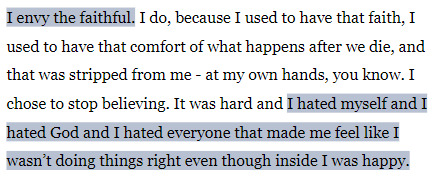
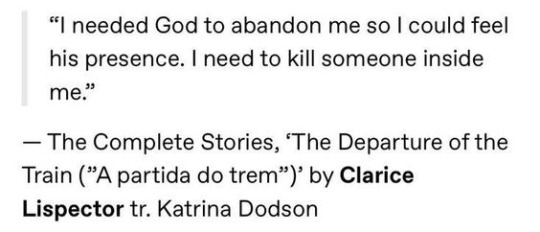

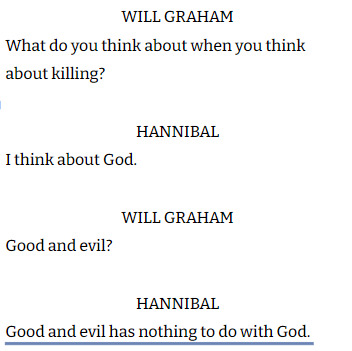
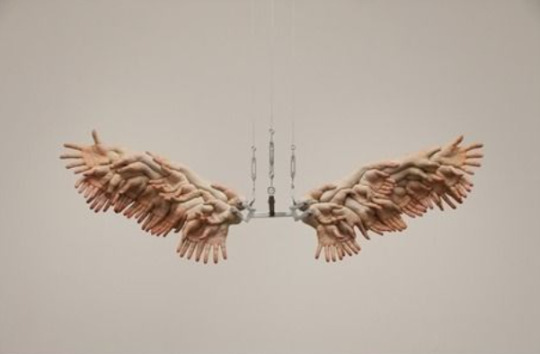
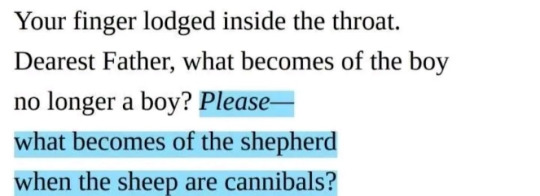
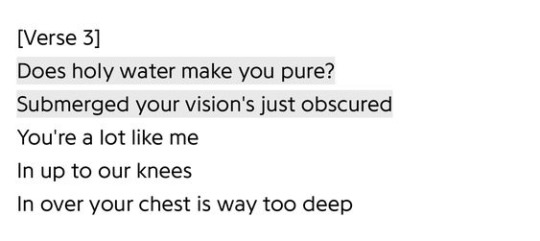

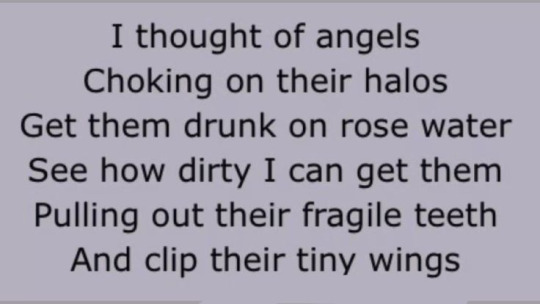

GOD LOVES YOU, BUT NOT ENOUGH TO SAVE YOU // GOD AND SUFFERING
Andrew Joseph White Hell Followed With Us // Elizabeth Lindsey Rogers Questions About the Father // Brittany Broski Why I Left the Christian Church // Clarice Lispector (tr. Katrina Dodson) "The Departure of the Train," The Complete Stories // @/katabasiss // "Shiizakana," Hannibal (2013-2015) dir. Michael Rymer // Xooang Choi // Ocean Vuong "Prayer for the Newly Damned," Night Sky with Exit Wounds // The Vaccines Wetsuit // Mitski I'm Your Man // Fall Out Boy Just One Yesterday // Hélène Cixous Readings: The Poetics of Blanchot, Joyce, Kafka, Kleist, Lispector, and Tsvetaeva
#i want to believe in something but i don't know how#tw religious trauma#on god#poetry parallels#poetry compilation#web weave#web weaving#andrew joseph white#elizabeth lindsey rogers#brittany broski#clarice lispector#hannibal#will graham#xooang choi#ocean vuong#the vaccines#mitski#fall out boy#fob#helene cixous#on self#on loneliness#on heartbreak#writing#poem#spilled poetry#words#spilled thoughts#poetry#dark academia poetry
941 notes
·
View notes